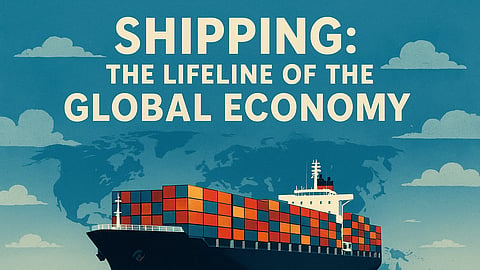Shipping: The Lifeline of the Global Economy
Shipping has long been the silent backbone of global trade and economic growth. Despite advances in air freight, rail networks, and road transport, maritime shipping remains the most cost-efficient and reliable mode for moving goods across the world.
It carries nearly 90% of international trade by volume, connecting producers to consumers and linking markets across continents. Without shipping, the global economy as we know it would simply not function.
The Scale of Shipping in Global Trade
From crude oil and liquefied natural gas to electronics, automobiles, and everyday consumer products, ships transport the commodities and manufactured goods that sustain industries and households worldwide. The scale is staggering—thousands of vessels move across oceans daily, ensuring that supply chains keep flowing.
Solar Power in the Middle East: Turning Deserts into Energy Hubs
The efficiency of maritime shipping lies in its ability to move vast amounts of cargo at relatively low cost. For instance, a single container ship can carry tens of thousands of containers, making it more economical and sustainable compared to air transport.
This scale directly contributes to stabilizing global prices. If shipping routes are disrupted—due to conflicts, natural disasters, or logistical bottlenecks—the ripple effects are immediately visible in higher costs of goods, fuel, and raw materials.
Driving Economic Growth and Jobs
Shipping not only supports trade but also creates millions of jobs worldwide. From seafarers and port workers to shipbuilders, engineers, and logistics managers, the industry generates direct and indirect employment. In addition, ports often become hubs of economic activity, spurring regional development by attracting industries, warehouses, and export-driven businesses.
For developing countries, shipping is particularly vital. Nations with access to efficient maritime infrastructure can integrate more easily into global value chains, expanding their economic opportunities. Exports of agricultural products, textiles, and minerals largely depend on cost-effective shipping routes, enabling these economies to compete in international markets.
Strategic Importance to National Economies
Maritime trade is not just about commerce—it also holds geopolitical and strategic importance. Countries with strong shipping industries and well-developed port infrastructure gain a competitive edge in global trade. Control over major shipping routes, such as the Suez Canal, Panama Canal, and Strait of Malacca, often translates into significant geopolitical influence.
In today’s interconnected economy, disruptions in one part of the shipping network—whether a blocked canal or piracy along a trade route—can have global consequences. This makes maritime security and investment in resilient logistics infrastructure essential for national and global stability.
Shipping and the Energy Economy
Energy trade is inseparable from shipping. Oil tankers, LNG carriers, and bulk carriers are critical to transporting the world’s energy supply. Asia, for instance, relies heavily on oil and gas shipments from the Middle East, while Europe depends on maritime imports for energy diversification.
As the global economy transitions to cleaner energy sources, shipping itself is evolving. The industry is increasingly investing in green fuels, alternative propulsion technologies, and energy-efficient vessels.
Thus, shipping not only facilitates the current energy economy but is also playing a role in shaping the sustainable energy systems of the future.
The Digital and Green Transformation
Like many industries, shipping is undergoing a technological transformation. Smart ports, digital tracking systems, and automation are making global supply chains more transparent and efficient. Digitalization reduces paperwork, improves cargo monitoring, and enhances coordination across global routes.
At the same time, the push toward decarbonization is reshaping the sector. The International Maritime Organization (IMO) has set ambitious targets to reduce carbon emissions, prompting innovations such as LNG-powered ships, hydrogen fuel, and wind-assisted propulsion.
These efforts are critical not only for the shipping industry but also for the global fight against climate change.
Why Shipping Matters More Than Ever
In a world increasingly shaped by globalization, e-commerce, and just-in-time manufacturing, the role of shipping continues to grow. Even digital economies rely on physical infrastructure—smartphones, servers, and electronic goods all reach consumers via ships. Without efficient shipping, international trade would slow, supply chains would falter, and economic growth would be severely constrained.
The COVID-19 pandemic underscored this dependency. When global shipping routes were disrupted, industries from healthcare to technology faced shortages and rising costs. This revealed not only the fragility but also the irreplaceable role of maritime shipping in sustaining economies.
Anchoring Global Prosperity
Shipping is far more than a mode of transport—it is the engine that powers global trade and sustains economic growth. By moving goods, energy, and raw materials across continents, it keeps industries alive, creates livelihoods, and strengthens international connections.
As the world faces new challenges—from climate change to supply chain disruptions—shipping will continue to evolve with cleaner technologies and smarter systems. Building a resilient and sustainable maritime sector is not just important for trade—it is vital for securing prosperity, stability, and progress in the global economy.


